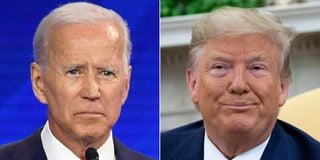US election outcome will greatly impact Africa’s security agenda

Democratic presidential niminee Joe Biden (left) and US President Donald Trump.
What you need to know:
- As the winner takes office in January 2021, Kenya will also be taking up its seat as a non-permanent member of the UN Security Council.
- Second, the Trump regime has constantly questioned the science of climate change and pulled out of environmental treaties.
- Biden has described climate change as “the greatest threat to our security”, proposing a “revolution” to address its impact and releasing a plan to invest in new technology and infrastructure to curb emissions.
On November 3, 2020, Americans will elect their president for the period 2021-2024. The outcome of the election matters immensely for Africa. It offers a rare window for Africa to craft a new, assertive post-2020 security agenda. As the winner takes office in January 2021, Kenya will also be taking up its seat as a non-permanent member of the UN Security Council.
The US election outcome presents two scenarios. One is a win for President Donald Trump and Vice President Mike Spence. This status quo scenario is unlikely to reverse the regime’s populist, isolationist, protectionist and anti-migration policies.
The second scenario is a win for former Vice-President Joe Biden and California Senator Kamala Haris (the first African-American and first Indian-American and the third female vice-presidential nominee on a major party ticket).
The two are tipped to win, with all polls putting them ahead of Trump and Pence. But for the first time, there are speculations that the doctrine of “peaceful transition” axial to American democracy might be in jeopardy. Trump might refuse to leave office should he lose the election. The big question is: what will be the implications of the results for security and counter-terrorism in Africa?
America’s highly dynamic African policy has evolved over four phases. The first, between 1945 and 1989, coincided with the Cold War and focused on minimising the influence of the Soviet Union in Africa.
The second phase, between 1989 and 2001, followed the end of the Cold War after 1989. Washington encouraged improved human rights practices and greater democratic governance based on multiparty systems and term limits.
al-Qaeda attacks
The third phase, after the September 11, 2001 al-Qaeda attacks and the subsequent ‘global war on terror’ at the dawn of the new millennium, was dominated by counterterrorism. In the Horn, this policy centred on preventing Somalia from becoming a safe haven for al-Qaeda or other transnational jihadist groups.
The fourth phase coincided with the rise of China after 2010. This marked the return of Cold War-era geopolitics. With the rise of Trump after 2016 and the uncertainty of American democracy and economic woes, the US has lost much of the glamour, lustre and moral force of an imperial power. But, as they say, “It ain’t over until the fat lady sings.”
The US poll provides diametrically opposed visions for African security at five levels. First, on counterterrorism, Trump has stressed an approach that combines domestic surveillance, expanded use of drone strikes in Africa and tighter immigration. Biden proposes a new strategy called “counterterrorism plus” that stresses fighting terrorist networks by using small groups of US special forces – instead of large deployments – supported by aggressive air strikes. This strategy is likely to benefit the UN-sanctioned African Mission in Somalia (Amisom), which is fighting al-Shabaab in Somalia.
Second, the Trump regime has constantly questioned the science of climate change and pulled out of environmental treaties. Biden has described climate change as “the greatest threat to our security”, proposing a “revolution” to address its impact and releasing a plan to invest in new technology and infrastructure to curb emissions.
Third, while Trump has repeatedly downplayed the Covid-19 threat, his regime’s approach has failed to contain the disease.
Biden has put forward a national plan to restore the US’s global leadership on the coronavirus crisis. This would benefit the Horn.
Fourth, on global governance, Trump has championed unilateralism and militarism, pushed for increased defence spending and “great-power competition” with China.
Asylum-seekers
Biden has emphasised multilateralism, diplomacy, alliances and global institutions. This approach is ideal for peace and security in Africa.
Five, on refugees and asylum-seekers, Trump has campaigned on the platform of sharply reducing both legal and illegal immigration, including erecting walls to keep away immigrants. Biden has termed Trump’s approach “morally bankrupt” and “racist”. Instead, he has called for a comprehensive immigration reform, stressing the need to address the root causes of immigration in the countries of origin such as Somalia and South Sudan.
Both appear to converge on their response to China’s rising global influence. In the run-up to the November election, Trump has whipped confrontation with China to fever-pitch. He has accused Beijing of economic abuses, intellectual property theft, currency manipulation, export subsidies and economic espionage. Trump has called for aggressive action to protect US workers and reduce America’s large bilateral trade deficit.
Similarly, Biden has criticised Beijing’s “abusive” trade practices, warning that Beijing may get ahead of the US in new technologies. He has promised more effective pushback against China than Trump and to work more closely with allies to contain Beijing. Biden and the democrats will hype Beijing ’s alleged poor human rights record, pressurising allies in Africa to isolate China.
As a pivotal state in Africa, Kenya has to champion Africa’s interests in the UN Security Council in a divided world. It should push for a collective response to global security threats, terrorism and violent extremism , climate change and epidemics such as Covid-19.
Prof Peter Kagwanja is CEO of Africa Policy Institute. This paper was prepared for the Seminar on ‘Countdown US Elections 2020: Implications for Africa.’ September 18, 2020.




